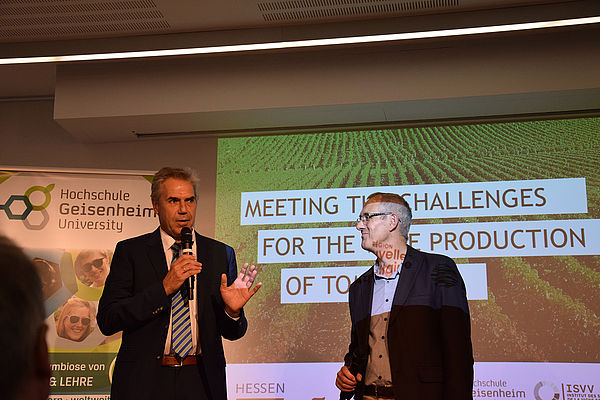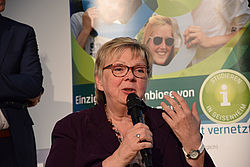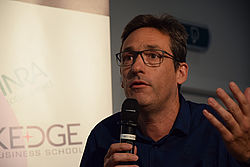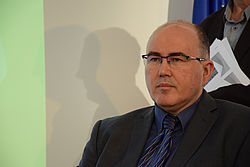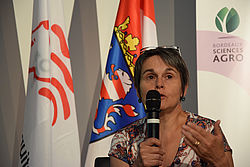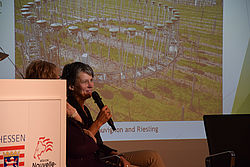Wine has long outgrown its classic growing regions, with wineries operating as successful businesses in countries where they were regarded as a curiosity just a few decades ago. In addition to globalization, climate change is the main driver of this development. But what challenges does it hold in store for wine producers, especially in Europe and what effects does it have on the product? Representatives of Hochschule Geisenheim University, the Institut des Sciences de la Vigne et du Vin (ISVV) of the University of Bordeaux and the OIV – Organisation Internationale de la Vigne et du Vin tried to answer these questions while also giving an insight into their work, during a panel discussion at the Hessische Landesvertretung in Brussels on Tuesday, June 26, 2018. In a well-filled conference room with over 250 guests, the event generated lively interest.
"The consequences of climate change for viticulture are enormously complex. Changes in temperature, more extreme weather conditions, increased concentration of carbon dioxide in the air, changes in soil nutrient composition: all this changes the cultivation conditions and thus also the product," said Prof. Dr. Hans Reiner Schultz, President of Hochschule Geisenheim University, who led the discussion with Prof. Dr. Alain Blanchard, Head of the ISVVV.
One of the biggest problems for winegrowers in recent years has been the increasing pressure from new pests such as Drosophila suzukii or Scaphoideus titanus, which is already causing damage in France and may soon find its way into German vineyards. "Even well-known pests are becoming increasingly difficult to control due to the increasing fluctuations in precipitation," explained Prof. Dr. Annette Reineke, Vice President of Research and Head of the Institute of Crop Protection at Hochschule Geisenheim University. "The time window in which winegrowers can successfully use crop protection is getting smaller and smaller. As scientists, we are under pressure to develop efficient and sustainable strategies for pest control and make them accessible to the industry.
Breeding could play an important role in this, says Dr. François Delmotte of the ISVV: "By using the natural resistance or tolerance of the vine, we can significantly reduce the use of chemical pesticides in the future. And what is more, today we can already produce high-quality wines from varieties that have been bred and selected for decades and are resistant to fungi." But are new, resistant varieties competitive? According to the experts, consumer acceptance is still lacking in most cases today. However, they hope that awareness of the importance of sustainable production will lead to a rethink in the future, helped by corresponding marketing strategies.
In the discussion, the scientists also warned about the expected changes in known products:rising temperatures lead to an increase in the alcohol level of the wine, whereas a decrease in acidity is expected. "Overall, the aroma of the wines will change significantly; we expect the taste of different varieties to become more uniform," Prof. Dr. Pierre-Louis Teissedre from the ISVV predicted. The changes in climate and terroir could be reasons that a Riesling from the classic growing areas no longer tastes like Riesling in a few years; Champagne from Champagne no longer tastes like Champagne; Cabernet Sauvignon from the Aquitaine region, which also includes Bordeaux, would lose its profile in the future.
"The economic importance of viticulture for the EU must not be underestimated", Prof. Dr. Monika Christmann, President of the OIV - Organisation Internationale de la Vigne et du Vin and Head of the Institute of Enology at the Hochschule Geisenheim University, stressed. "Wine producers, scientists and politicians must work on common strategies in all sub-disciplines, from cultivation to marketing, so that Europe can maintain its status as a producer of high-quality wines in the future.
According to Dr. Nathalie Ollat of the ISVV, this requires transnational cooperation in research on the challenges and consequences of climate change. "Initiatives such as the BAG Alliance, a virtual institute of the University of Bordeaux, the Australian Wine Research Institute in Adelaide and Hochschule Geisenheim University, enable us to create synergies worldwide and make scientific findings available to companies.”
At the end of a lively discussion with the audience, Prof. Blanchard gave a clear message to the guests: "Viticulture currently has a very good position in Europe. This is also due to cooperation such as the one between Hochschule Geisenheim University and the University of Bordeaux. However, we must work hard - also with the support of the EU - to ensure that this remains the case. We must further intensify transnational research in viticulture and enology in the face of climate change."

